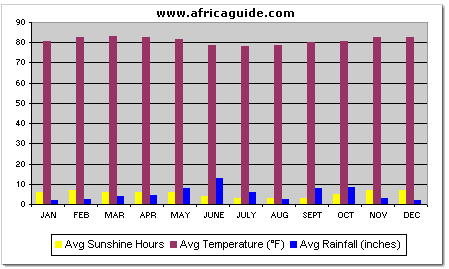Nigeria Visitor Information
Parent page
On this page
Although Nigeria lies wholly within the tropical zone, there are wide climatic variations in different areas of the country. Near the coast, the seasons are not sharply defined. Temperatures rarely exceed 32°C (90°F), but humidity is very high and nights are hot.. Inland, there are two distinct seasons: a wet season from April to October, with generally lower temperature, and a dry season from November to March, with midday temperatures that surpass 38°C (100°F) but relatively cool nights. On the Jos Plateau, temperature are more moderate
Average rainfall along the coast varies from 70 inches in the west to about 170 inches in certain parts of the east. Inland it decreases to around 50 inches over most of central Nigeria and only 20 inches in the extreme north.
Two principal wind currents affect Nigeria; the harmattan, from the northeast, is hot and dry and carries reddish dust from the desert. and causes high temperatures during the day and cool nights. and the southwest wind brings cloudy and rainy weather.
Visas are required by everyone except national from Benin, Burkina Faso, Cape Verde, The Gambia, Ghana, Guinea-Bissau, Ivory Coast, Liberia, Mali, Mauritania, Niger, Senegal, Sierra Leone and Togo. Passport must be valid for a minimum of 6 months after the intended departure date. Visas are not issued on any land borders or on arrival at the airport.
Nigerian Tourist offices and/or embassies located around the world
Official Currency: 1 Niara=100 kobo
Current Exchange Rate: Today's Exchange Rate
Air
Domestic flights operate between Lagos and Maiduguri, Abuja, Kaduna, Benin City, Enugu, Kano, Jos, Port Harcourt, Calabar, Sokoto and Yola and someother cities. Helicopters have regular flights to the oilfields, and charter services are available as well. Fares can be paid for in local currency.
Railways / Train Services
The service connects Lagos to Kano and Port Harcourt to Maiduguri with stopovers at various towns. The service is unreliable and poor and often does not run. but when it does it is a cheap way of getting around.
Bus
The southern part of the country is well connected by a bus service but further north the main form of transport is shared taxis of up to six people.. Motorcycle taxis are common in the cities and outskirts.
Road
Road conditions are deteriorating and there are many pot-holes. Some lesser used roads are impassable during and after the rains. Beware of unmarked roads blocks. Petrol is very cheap in Nigeria. Driving is on the right hand side and an International Driving Licence is required. Car Hire is available in Lagos and Abuja.
1st January New Year's Day
1st May Worker's Day
1st October National Day
25th December Christmas Day
26th December Boxing Day
Variable holidays Good Friday and Easter Monday, and various Islamic Holidays
Electric Power is 220V - 240V running at 50Hz.
The Plug type used Nigeria is: "Type D & G (British)"


